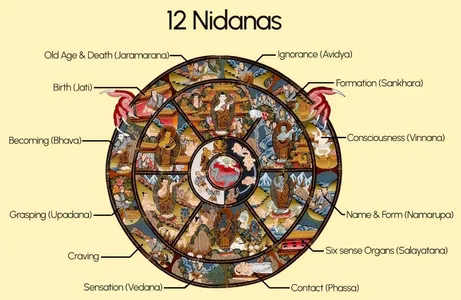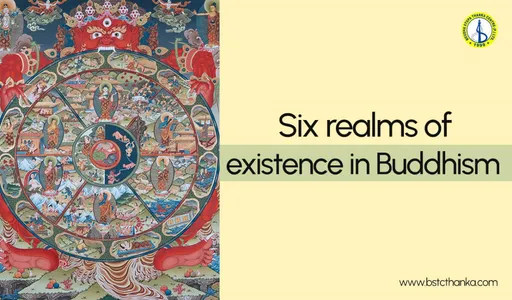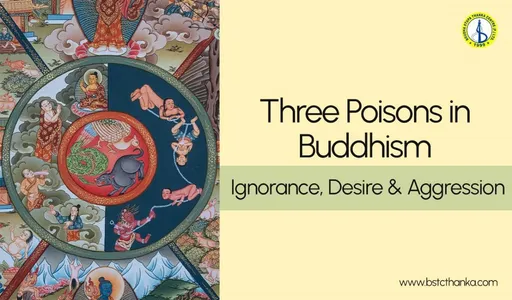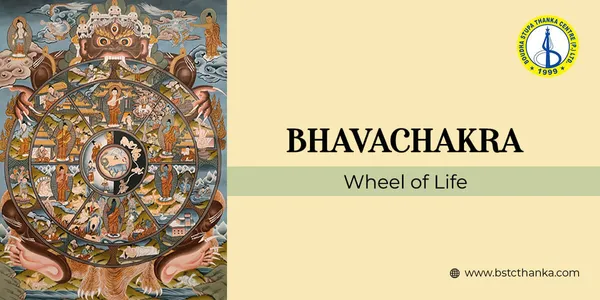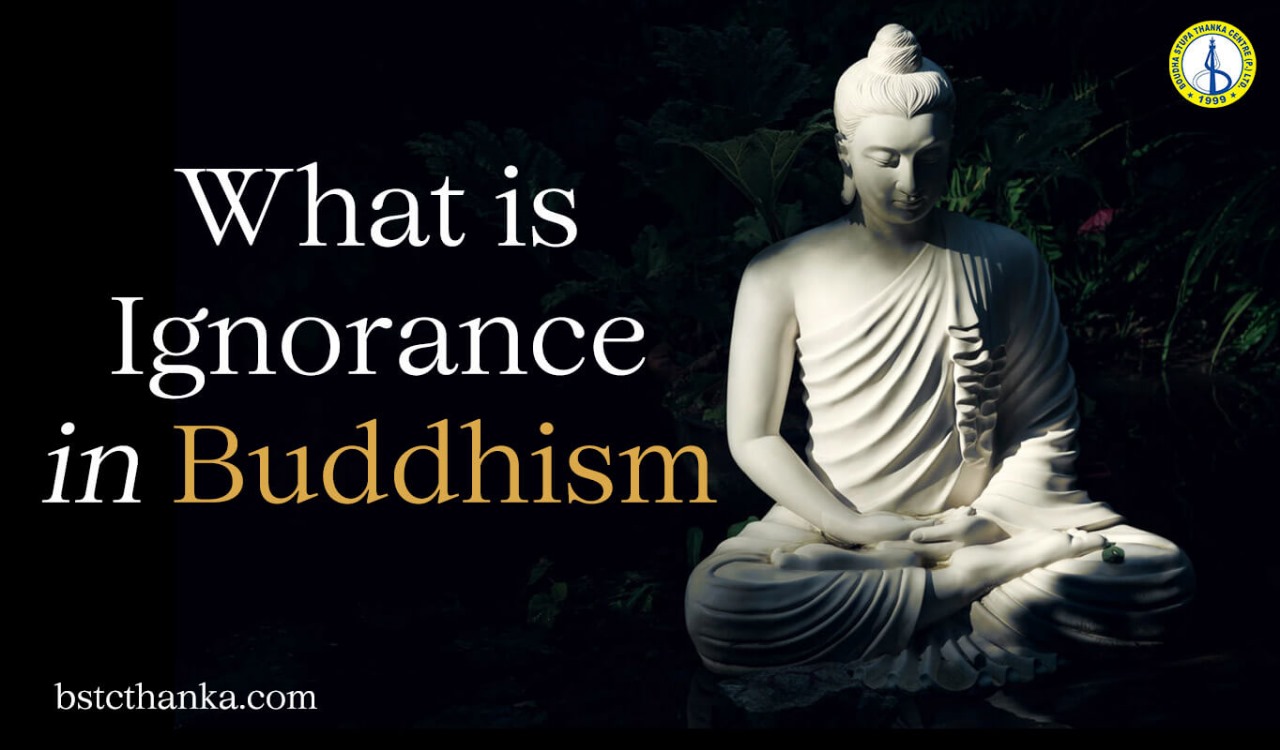
What Does Ignorance Mean in Buddhism?: (Delusion or Avidya)
In Buddhism, ignorance, known as “avidya” in Sanskrit or “avijja” in Pali, is one of the three poisons that cause suffering. The other two poisons are craving and aversion. Ignorance is not just a lack of knowledge but a fundamental misunderstanding of the true nature of reality. It is the root cause of our misconceptions and delusions, leading us to see the world in a distorted way. This misunderstanding keeps us trapped in a cycle of rebirth and suffering, known as samsara.
Ignorance also plays a crucial role in the Buddhist concept of dependent origination, which explains how suffering arises. In this teaching, ignorance is the first of twelve links in a chain that leads to suffering. It's seen as the starting point that sets everything else in motion. Because people don't understand the true nature of things, they make choices that lead to more confusion and pain. By recognizing and working to overcome ignorance, Buddhists believe we can break this chain and find a path to freedom from suffering.
How Ignorance is Understood in Buddhism?
In Buddhism, Ignorance(delusion) is a key concept that helps us understand why we suffer and how we can find true happiness. It means not seeing things as they truly are. Ignorance is closely related to several important teachings: dependent origination, the three poisons, and the Four Noble Truths. Let's explore how ignorance connects to each of these teachings:
1. Ignorance and Dependent Origination
The 12 links of dependent origination explain how everything is interconnected and show how one thing leads to another. Ignorance is the first link in this chain. When we don’t understand the true nature of things, it leads to a series of events that cause suffering. For example, ignorance leads to desires, which then lead to actions that keep us trapped in a cycle of rebirth and suffering.
2. Ignorance and the Three Poisons
In Buddhism, the three poisons are ignorance, desire, and aggression. Ignorance is considered the root cause of the other two poisons. Ignorance means not understanding the true nature of reality - that all things are impermanent and without a permanent self. It is ignorance that leads us to crave and grasp things we want (desire) and to push away and hate things we don't want (aggression). The three poisons are often depicted in the center of the Buddhist Wheel of Life, showing how ignorance is the fundamental cause of our suffering and the cycle of rebirth.
3. Ignorance and the Four Noble Truths
The Four Noble Truths are the core of Buddhist teaching and outline the nature of suffering and the path to ending it. Ignorance is connected to these truths in the following ways:
The First Noble Truth (Suffering): Ignorance leads us to misinterpret the nature of suffering. We might not recognize that our desires and attachments are the sources of our suffering.
The Second Noble Truth (Cause of Suffering): The cause of suffering is craving and attachment, which are fueled by ignorance. We desire things we think will make us happy, not realizing that this craving is rooted in a misunderstanding of what will bring true happiness.
The Third Noble Truth (End of Suffering): Ignorance prevents us from seeing that suffering can be ended. We may not believe that there is a way out of our struggles because we don't understand the nature of true contentment and liberation.
The Fourth Noble Truth (Path to End Suffering): The path to end suffering is the Eightfold Path, which involves understanding, ethical conduct, and mental discipline. Ignorance makes it difficult for us to follow this path correctly because we lack insight into the true nature of reality and our own minds.
How to Break Free From Ignorance?
Breaking free from ignorance in Buddhism involves cultivating wisdom and understanding to see things as they truly are. Here’s how you can work towards overcoming ignorance:
1. Study and Learn
The first step is to educate yourself about the teachings of Buddhism. This includes learning about the nature of reality, the Four Noble Truths, and the Eightfold Path. Understanding these concepts helps you see beyond your current misconceptions and gain a clearer view of the world.
2. Practice Mindfulness
Mindfulness involves paying close attention to your thoughts, feelings, and actions in the present moment. By being mindful, you can observe how your ignorance affects your behavior and reactions. The self-awareness helps you recognize patterns of delusion and make more informed choices.
3. Meditation
Meditation is a powerful tool to calm the mind and develop insight. Through regular meditation, we can observe our thoughts and emotions without attachment. Meditating on thangkas helps us see the true nature of our experiences and reduces ignorance.
4. Cultivate Wisdom
Wisdom in Buddhism is the understanding of the true nature of reality. This includes understanding impermanence, suffering, and non-self. By cultivating wisdom, we can see through the illusions created by ignorance and develop a clear, compassionate view of the world.
5. Cultivate Compassion
Developing compassion for yourself and others helps break down the barriers created by ignorance in Buddhism. When you act with kindness and empathy, you start to see beyond superficial differences and recognize the interconnectedness of all beings.
Conclusion
Ignorance is more than just not knowing things - it's misunderstanding how the world really works. This misunderstanding causes us to suffer and keeps us stuck in unhelpful patterns. By learning Buddhist teachings, practicing mindfulness and meditation, and developing wisdom and compassion, we can start to see things more clearly. This journey isn't always easy, but it's worth it. As we break free from ignorance, we become happier, more peaceful, and better able to help others. Remember, every step towards understanding is a step away from suffering. By overcoming ignorance, we're not just improving our own lives - we're contributing to a more enlightened world.
FAQs
What do Buddhists believe about ignorance?
In Buddhism, ignorance means not understanding the true nature of reality. It is a fundamental misunderstanding that leads to suffering and the cycle of rebirth. Ignorance is considered the root cause of the other two poisons - greed and hatred.
What is the origin of ignorance in Buddhism?
In Buddhism, ignorance originates from our fundamental misunderstanding of the true nature of reality. It stems from not recognizing the impermanence of things, the lack of a permanent self, and the interconnectedness of all existence.
How to overcome ignorance in Buddhism?
Overcoming ignorance involves gaining wisdom through study, meditation, and ethical living. Understanding the Four Noble Truths and the nature of reality helps reduce ignorance.




